
Photo from 2023 commencement. Back (L to R): Professors Friedrich Sommer and Daniel Feldman. Middle: Professor Michael Silver, Christiane Voufo, Dariya Bakshinska, professor Joni Wallis. Front: Professor Marla Feller, Celia Ford, Molly LaPoint, professor Ehud Isacoff. Photo by GradImages.
Congratulations to our recent and upcoming Neuroscience PhD Program graduates: Joseph Aman, Dariya Bakshinska, Bill Croughan, Celia Ford, Molly LaPoint, Arjun Mukerji, Ben Shababo, Christine Tseng, and Christiane Voufo!
Voufo was the student speaker at the spring commencement ceremony, which was hosted by the department of Molecular and Cell Biology and spanned several PhD programs.
Read our Q&A below with some of the graduates to learn about their most interesting discoveries, future plans, and words of advice.
Dariya Bakshinska, Isacoff lab 
Thesis: Synaptic heterogeneity and the underlying molecular mechanisms at the Drosophila neuromuscular junction
What is the most interesting thing you discovered in your research here?
Almost every function the brain performs, from learning and memory to sensory adaptation, relies on changes at the level of synapses. What’s surprising is that synapses — even neighboring ones within a single neuron — can vary greatly in their transmission properties. This synaptic heterogeneity in transmission is essential for the nervous system to function properly. My goal was to understand what are the local, molecular differences between synapses that ensure this functional heterogeneity. We found that it’s not only a few essential proteins that can drive these differences but also their biophysical state.
What are you doing next?
I’ll be finishing up my paper in the lab and then we’ll see!
Do you have any advice for incoming or current students?
Find your community and spend time outside of research doing things that make you happy.
Bill Croughan, Foster lab
Thesis: Closed Loop Investigation of Hippocampal Replay
What is the most interesting thing you discovered in your research here?
I studied how memories are formed and retrieved, and built tools to study this process in rodents. I was continually impressed by how separable different aspects of cognition are. Even while interfering with these memory processes, they continued to behave entirely normally in every other way.
What are you doing next?
Playing a lot of music, and working on music technology.
Do you have any advice for incoming or current students?
Don’t forget to keep learning about parts of neuroscience that aren’t directly related to your work. It’s all interesting!
Celia Ford, Wallis lab
Thesis: Orbitofrontal-hippocampal state coding dynamics during learning and decision-making
What is the most interesting thing you discovered in your research here?
Once a monkey has been playing a game long enough that they’ve figured out its structure, their brain (specifically, the orbitofrontal cortex and the hippocampus) starts to preemptively represent upcoming conditions moments before they appear. This finding hints at how our brains help us quickly adapt our behavior when the world changes.
What are you doing next?
I’ll be a AAAS Mass Media Fellow at WIRED Magazine this summer, and hopefully diving into science journalism full time afterwards.
Do you have any advice for incoming or current students?
Listen to what your burnout is telling you, and don’t forget to prioritize your happiness!
Arjun Mukerji, Silver lab
Thesis: Two experiments using brain imaging to answer questions about the neural basis of human vision
What is the most interesting thing you discovered in your research here?
Subcortical structures are doing a surprising amount of stuff!
What are you doing next?
Working part-time as a data scientist and skiing a lot.
Do you have any advice for incoming or current students?
Work hard but make sure to have fun and make friends too.
Christine Tseng, Gallant lab
Thesis: Investigating the effects of context on semantic representations in the brain and mapping social representations in the brain
What is the most interesting thing you discovered in your research here?
The brain represents information about the self and different types of other people in distinct brain regions.
What are you doing now?
I’m currently continuing as a postdoc in the Gallant lab.
Do you have any advice for incoming or current students?
Have fun, take breaks, and don’t be afraid to try crazy things.
Christiane Voufo, Feller lab
Thesis: Circuit Mechanisms Underlying Embryonic Retinal Waves
What is the most interesting thing you discovered in your research here?
The most interesting thing I discovered in my research here at Cal, was that embryonic retinal waves are more complex and nuanced than first meets the eye. The underlying circuit mechanisms that generate them involve both chemical and electrical synapses.
What are you doing now?
At the moment I’m working at the World Bank as a consultant for the education technology team. What’s really interesting about my current work is discovering all the ways in which my neuroscience/research background can become integral to the work I do here. One of the projects I’m currently working on that I’m the most excited about, looks at how we can make STEM education and research in Africa more accessible.
Do you have any advice for incoming or current students?
My advice to incoming and current students is to make sure that you understand the purpose behind everything that you do, no matter how trivial it may seem. It’s important to be driven by something greater than our individual curiosities, and purpose is one of them. When you feel like there is a purpose to what you’re doing, you’re more likely to do it well.
—
View all Neuroscience PhD Program graduate Q&As.


